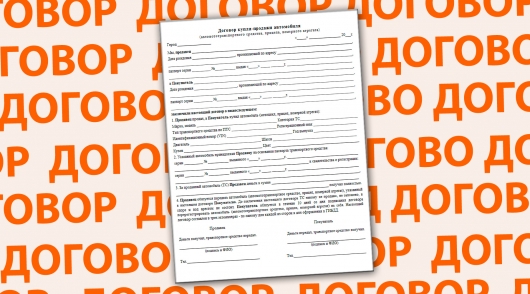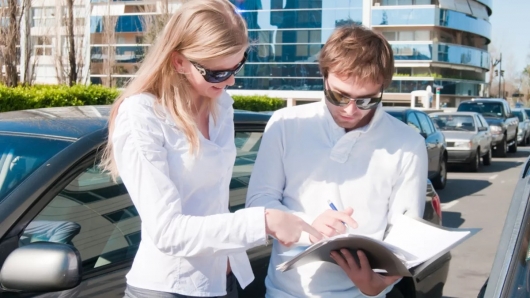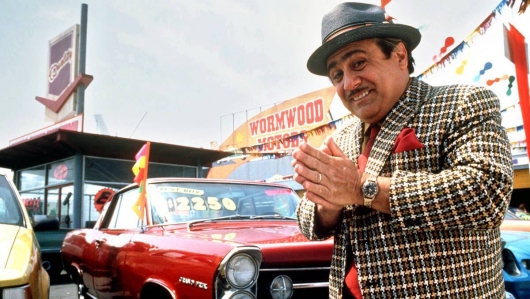The contract of sale of the car: how can you remain without money and without a car
Like, buying a car, don’t lose it because of the bankruptcy of the former owner.

So, you become the proud owner of any car. But do not hurry to rejoice. Did you know that any contract of sale may be cancelled on application as the former owner of the car and third parties. luckily, in most cases, to terminate the contract of purchase and sale is almost impossible, even through the courts.
If only we are not talking about buying a car from a bankrupt. No matter who is the former owner of the car – legal. entity, individual entrepreneur or physical person. The worst thing that any contract of sale may be challenged if the transaction was concluded within 3 years prior to the adoption of the statements of the former owner of the property on declaring bankruptcy. The transaction may be cancelled and upon receipt of the bankruptcy petition.
That is, if you purchased the car from the owner, who later filed a bankruptcy petition in connection with the inability to pay your debts, you risk becoming a party to the litigation where the bankruptcy Trustee appointed by the bankruptcy of the former owner of the car, may try to prove to the court that your trade was imaginary, and therefore may be invalid!
How so? But what about the right new owner for your property? After all, he gave their hard-earned money and, in fact, is a bona fide purchaser. That may be so, but not quite. In fact, to cancel the contract of purchase and sale, the court will decide, and only after the statements of the Trustee, which is responsible for the bankruptcy of the former owner. To the transaction was declared invalid, the bankruptcy Trustee must PROVE that the transaction was IMAGINARY, ie not real, the purpose of which was to withdraw from possession of the debtor’s property, to which creditors might impose penalty.

On the one hand, most buyers have nothing to worry about, as do the usual purchase of a car on a car at the unfamiliar car owner will have signs of a bona fide purchase of the vehicle. However, the new owner is still in court have to prove the bona fides of the purchase of the car and that he did not know about the problems of the former owner.
Unfortunately, it is not always easy. Especially when the old-fashioned way, many motorists are still in the contract of purchase and sale underestimate the value of the car. For example, when the vehicle is sold at market value, and the contract of sale specifies the amount several times less. Many do, to go in the future from income tax in case of sale of the car. Also often do the dealers cars to understate the taxation base in the resale of cars.
What laws are governed by bankruptcy Trustees who want to cancel the transaction of purchase and sale?

First, let us recall article 174.1 CC:
Article 174.1. The effects of the transaction in respect of property, the disposal of which is prohibited or restricted
But it is not important, what guided by curators, searching for the property of the debtor. As a rule, submitting the claim in court about recognition of any of the debtor’s transactions that occurred over 3 years prior to the filing of the bankruptcy petition, bankruptcy Trustees are guided by the Federal law No. 127-FZ of 26.10.2002 “On insolvency (bankruptcy)”. We are talking about articles 61.1 and 61.2:
Article 61.1. Contesting debtor’s transactions
(as amended by Federal law of 06.12.2011 N 409-FZ, dated 22.12.2014 N 432-FZ).
(clause 4 introduced by the Federal law from 29.06.2015 N 154-FZ).
Article 61.2. Challenge suspicious transactions of the debtor
If the sale of the property, performance of works, rendering of services are carried out at state regulated prices (tariffs) established in accordance with the legislation of the Russian Federation for the purposes of this article, in determining the appropriate rates apply the specified prices (tariffs).

The purpose of causing harm to property rights of creditors is presumed if at the time of the transaction the debtor was responsible or as a result of the transaction meets the signs of insolvency or insufficiency of the property and did not receive consideration or in relation to the person concerned or directed to the payment (appropriation) share (share) in property of the debtor to the founder (participant) of the debtor in connection with the release of the founders (participants) of the debtor, or committed in the presence of one of the following conditions
(as amended by Federal law of 28.07.2012 N 144-FZ, from 23.06.2016 N 222-FZ):
the cost transferred to the result of the transaction or several related transactions, of property or of commitments taken and (or) obligation is twenty percent or more of the book value of the assets of the debtor and the credit institution – ten or more percent of the book value of the debtor’s assets, determined according to the accounting statements of the debtor for last reporting date before making the transaction or transactions;
the debtor changed his place of residence or location, without notifying creditors before the transaction or after the transaction, or concealed its property, or destroyed or distorted legal documents, accounting documents and (or) other statements or documents, the keeping of which is stipulated by the legislation of the Russian Federation, or as a result of improper performance by the debtor of obligations on storage and accounting have been destroyed or distorted these documents
(as amended by Federal law dated 28.07.2012 N 144-FZ);
after the transaction on transfer of property the debtor continued to use and (or) possession of the property or to give directions to the holder about the fate of the property.
What threatens new owner of the car if the deal will be annulled in court because of the bankruptcy of the former owner?

As we have said, the bankruptcy Trustee in court to prove that your contract of sale was made for shelter, or the withdrawal of assets of the debtor. Doing so is not easy. But if you knew why the former owner sold his car (for example, lower than the market price or asks to specify in the contract a low amount, revealing the card to their debt problems), then you may have problems due to good faith acquisition of the car, as according to article 62.2 of the Federal law “On bankruptcy” the court has every right to recognize the transaction invalid, if the other party to the transaction knew about this goal of the debtor to the time of the transaction.
In this case, you will have to prove in court that not a camel, but merely bona fide purchaser of the car (although under the law you have nothing to prove, but, alas, in our country, the laws often work ideally on paper).
Unfortunately, Russia has an ambiguous judicial practice in such cases. And most bankruptcy Trustees have successfully obtained to cancel even the three-year deal for the sale of cars.
What will happen if the transaction of sale of the car is void?

In this case, the transaction would be illegal, and, therefore, lead to a series of actions by the bankruptcy Trustee, who will require you to return your vehicle. In this case the seller of the vehicle must return to the buyer money. But you know that you will not get back their money, because the official of the bankrupt they are not.
In this case, the bankruptcy forms new debt (this time in front of customer car) that will be included in the total amount of the creditor’s claims. But you can not expect to get all of your money, because even if the bankruptcy Trustee find assets of the debtor, which will be sold along with other creditors, you money just is not enough.
Whether the transaction of purchase and sale to be challenged if the vehicle was purchased before the debts of the former owner?
Many wonder: how is it that the bankruptcy Trustee can file suit in court to challenge the agreement of purchase and sale, committed before the debts of the former owner of the vehicle. But this is nothing surprising.
Yes, indeed, the bankruptcy Trustee acting for the benefit of creditors, has every right to try to challenge all transactions of the debtor that filed for bankruptcy committed within three years before the filing of the bankruptcy petition and after (article 61.2 of the Federal law on bankruptcy).
In some cases, the transaction of sale of the car was deemed illegal?

As we have said, the bankruptcy Trustee will not be easy to prove in court the invalidity of the transaction of purchase and sale the car as he will need to convince the court that a suspicious transaction has the following characteristics:
- – the deal was done with intent to cause harm to property rights of creditors
- – as a result of the transaction caused harm to property rights of creditors
- – other party to the transaction knew or should have known about this goal of the debtor to the time of the transaction
If the court is proven all three points, the transaction is likely to be deemed illegal. In this case, the new owner will have to return the car to the creditors, but rather the administrator. The former owner will have to return the money, which, naturally and logically, he would not.
Here is the resolution of the Plenum of the Supreme Arbitration court of the Russian Federation No. 63 of December 23, 2010 (as amended on July 30, 2013):
“On some issues related to the application of Chapter III.1 of the Federal law “On insolvency (bankruptcy)”
a) the deal was done with intent to cause harm to property rights of creditors;
b) as a result of the transaction caused harm to property rights of creditors;
C) the other party to the transaction knew or should have known about this goal of the debtor to the time of the transaction (subject to paragraph 7 hereof).
In case of failure to prove even one of these circumstances, the court denies the recognition of the transaction void on this ground.
When addressing the issue of whether there was another party to the transaction be aware of these circumstances, is taken into account that, as far as she could, acting reasonably and as required from it under the terms of the turnover diligence to establish the existence of these circumstances. According to the second paragraph of paragraph 3 of article 28 of the Law on bankruptcy information on supervision, financial rehabilitation, external management, about recognition of the debtor the bankrupt and about opening of competitive production is subject to obligatory publication in the manner prescribed by the named article.
In this regard, in the presence of such publications, in case of contestation on the basis of paragraph 2 of article 61.2 of the bankruptcy Law transactions made after these publications must come from the following: if not proven otherwise, any person should know that you have entered the procedure of bankruptcy, and hence that the debtor has signs of insolvency.
Accordingly, if you do not know about the debts of the seller of the car, and also about the true purpose of the sale of the property, the bankruptcy Trustee can not accept your transaction illegal.
How to prove that the transaction was valid if you bought a car worth 1 million rubles, but the contract was prescribed 150 000 RUB?

Despite the fact that in the Russian legislation to prove the invalidity of the transaction in court, the bankruptcy Trustee must, in practice it turns out just the opposite. The fact that proceedings in the courts about the illegality of transactions of purchase and sale, one of the parties is bankrupt, often twisted in such a way that in the end, to prove his good faith purchase of the property has buyers.
Unfortunately, as you can see, it is not always the burden of proof is on the plaintiff. Sometimes they skillfully transferred this responsibility to the buyers. And if the part of bankruptcy Trustees, as a rule, there are competent lawyers, from the bona fide buyers often there is no strong legal protection. In the end, sometimes the bankruptcy Trustee fails to convince the court of the illegality of the transaction of purchase and sale and eventually to request from the possession of the new owner of the ill-fated possessions.

Especially it can be done, when the contract of sale indicated a disproportionately low value of the car. For example, if you buy a car for 1 million rubles, but in the contract specify the amount of times less than the average. In the future, if the former car owner declare bankruptcy, the bankruptcy Trustee associated with your transaction in court can cling to the fact that the car was sold at low cost, which at the time of the transaction was significantly below average.
In this case, the court may question the validity of the deal and your ignorance about the true purpose of the car seller. Then you have to prove that you actually bought a more expensive car. That’s why if the contract of sale specifies the understated value of the car, it is necessary to make the act of transferring money or receipts proving the true settlement of the transaction. Otherwise, you will be hard to prove that you actually bought the property at the normal market price.
How to protect yourself not to buy a car from a bankrupt?

Unfortunately, 100% protection from buying a car from a bankrupt no. Especially if at the time of conclusion of the contract of sale the seller of the vehicle (or its creditors) has not officially filed for bankruptcy. Under current law, even if after the transaction the former owner within three years become bankrupt, there is a risk of disputing your transaction according to the bankruptcy Trustee, acting on behalf of the lender.
However, every car buyer can still reduce the risk of such transactions.
To do this, in addition to the standard checks on the vehicle and vehicle owner online databases of traffic police, the Autocode, the basis of the court bailiffs, etc. you need to check whether the vehicle owner bankrupt or person (no matter what the person in question – legal or physical), for which filed a bankruptcy petition.
To do this, use a Single register of information on bankruptcy in the Russian Federation. Check out the information here.
Also suggest before buying a car, check the vehicle owner the existence of an arbitration cases against him. You can do this on the following websites:
http://kad.arbitr.ru/
However, please note that the search in arbitration cases more imprisoned under INN or OGRN. But, we think you can easily find out from the seller of the car it was or the details of the company, if the owner is the legal company or individual entrepreneur.
On the one hand, for most car buyers these troubles, of course, is not necessary. Moreover, the likelihood that your legitimate transaction for the sale canceled, minimum. Especially if you don’t know the seller and are not aware of its intentions and the contract of sale indicated the full market value of the car.
However, if you do not want in the future to run to court, lose a lot of nerves and time, then it is better to deal check the seller not only for the above mentioned databases, but also to see his debts, checking the car owner in the database of the bailiff service (FSSP Russia). If at least one of a database, you will find information about the owner of the car (including the basis of the Federal bailiff service of the Russian Federation) do not advise you to make a deal with this owner. Even if it is for some reason willing to sell you a car below market value.
Here is the base for the debts to the bailiffs of the Russian Federation:
http://fssprus.ru/iss/ip
